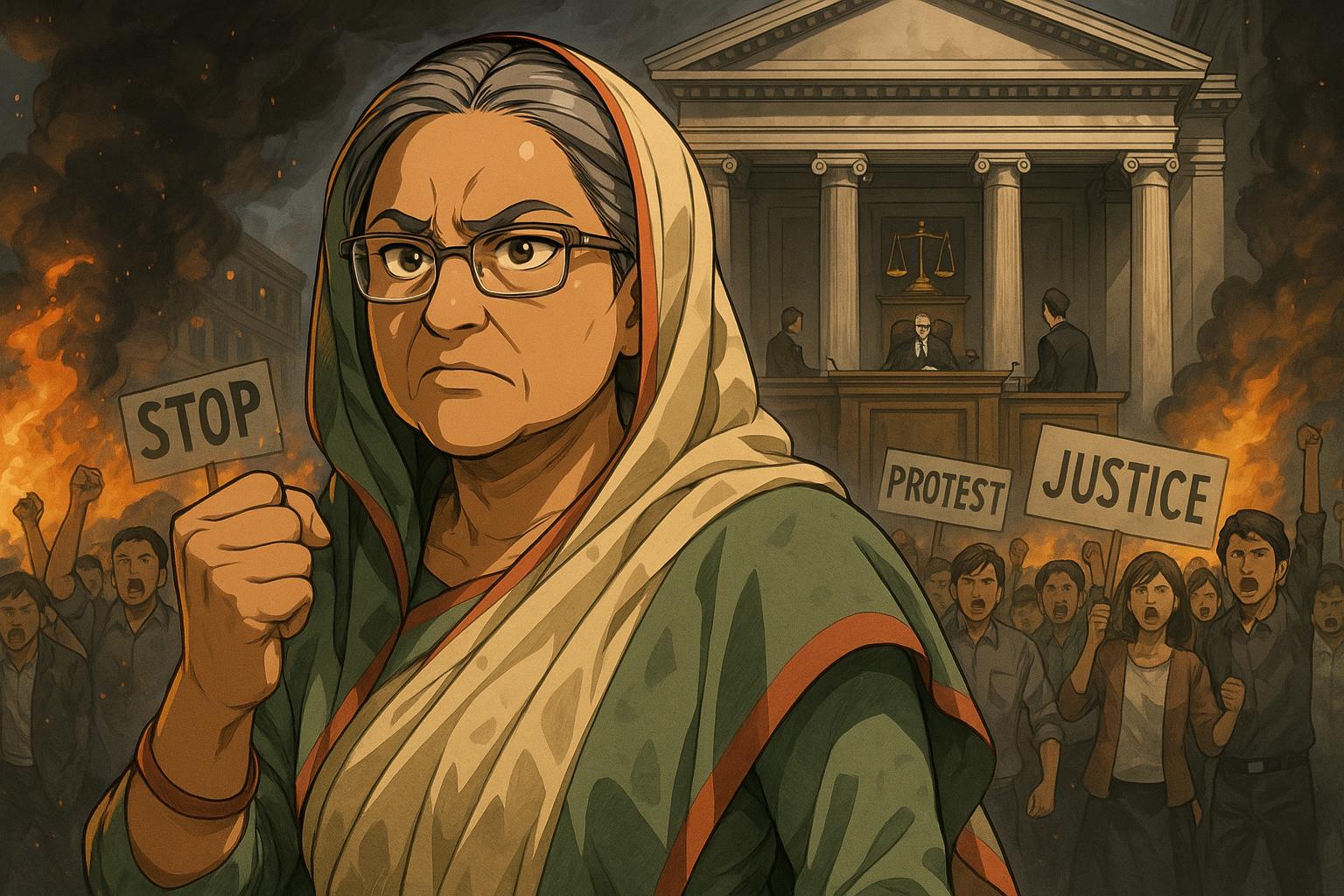Former Bangladeshi Prime Minister Sheikh Hasina has been charged with crimes against humanity related to deadly crackdowns during last year’s protests. As Bangladesh’s interim government seeks her extradition from India, allegations of mass killings, corruption, and political violence deepen the ongoing crisis.
The recent developments surrounding Sheikh Hasina, the ousted Prime Minister of Bangladesh, have taken a dramatic turn as she faces serious allegations of crimes against humanity. Following her flight to India amidst a violent uprising that led to her removal from power in August 2024, arrest warrants have been issued not only for her but for other high-ranking officials, including former Home Minister Asaduzzaman Khan and former police chief Chowdhury Abdullah Al Mamun, who has already been arrested.
The circumstances surrounding these charges are dire. The International Crimes Tribunal (ICT) in Bangladesh alleges that Hasina orchestrated brutal crackdowns on protesters, resulting in an estimated 1,400 deaths during the anti-government protests last summer. These actions reportedly included targeted violence against women and children, as well as the denial of medical treatment to the injured. Eyewitness accounts detail horrific incidents, such as the burning of a wounded protester alive, highlighting the severity of the accusations levelled against her.
Under investigation for a range of human rights violations, Hasina is also linked to broader allegations of corruption related to a £4 billion embezzlement probe involving her family, including her niece, Labour MP Tulip Siddiq. The Anti-Corruption Commission (ACC) has launched an inquiry into claims that both Hasina and her family illegally allocated state resources and profited from dubious deals. Siddiq has denied these allegations, calling them “targeted and baseless.”
International reaction has added layers to the unfolding scenario. Bangladesh’s interim government, now led by Nobel laureate Muhammad Yunus, has officially requested Hasina’s extradition from India. This request comes amidst rising tensions between India and Bangladesh, particularly as India has received communication regarding the extradition but has yet to comment publicly. The relationship between the two nations complicates matters further, especially given historical ties and recent accusations of human rights violations within Bangladesh.
Public sentiment in Bangladesh appears to be strongly against Hasina, with thousands participating in protests demanding justice for the victims of last summer’s violence. Advocacy groups continue to push for a transparent investigation into her actions and those of her affiliates. There are calls for not only her prosecution but also for the disbanding of the Awami League party, which has been accused of fomenting violence to maintain power.
As the situation evolves, the interim administration has pledged to uphold justice, inviting international oversight in what they describe as an urgent need for accountability. The complexities of this case resonate far beyond Bangladeshi borders, intertwining issues of international extradition, human rights obligations, and geopolitical relationships, particularly between India and Bangladesh.
In the coming weeks, the ICT is set to commence proceedings against Hasina and several others accused of orchestrating the violence, with a court date scheduled for June 16, 2025. Should she fail to appear, it may pave the way for a trial in absentia, raising pressing questions about justice, governance, and human rights in Bangladesh.
 Reference Map:
Reference Map:
- Paragraph 1 – [1], [3]
- Paragraph 2 – [1], [2], [4]
- Paragraph 3 – [5], [6]
- Paragraph 4 – [1], [4]
- Paragraph 5 – [5], [6]
Source: Noah Wire Services
- https://www.dailymail.co.uk/news/article-14773627/Tulip-Siddiqs-aunt-charged-crimes-against-humanity-Bangladesh-involvement-mass-killings.html?ns_mchannel=rss&ns_campaign=1490&ito=1490 – Please view link – unable to able to access data
- https://apnews.com/article/e5ccb5ce4c340e86b0ecac7d9d98893f – On June 1, 2025, Bangladesh commenced the trial of deposed former Prime Minister Sheikh Hasina through a special tribunal for alleged crimes against humanity related to a 2024 mass uprising in which up to 1,400 people were reportedly killed. The tribunal accused Hasina of orchestrating violent crackdowns, resulting in mass killings, injuries, and targeted attacks, particularly against women and children. Hasina, currently in exile in India, along with former Home Minister Asaduzzaman Khan (also believed to be in India), and former police chief Chowdhury Abdullah Al Mamun (under arrest), are to appear before the court on June 16. The tribunal, originally established by Hasina in 2009 to prosecute war crimes from the 1971 independence war, is now being used against her following her ouster in August 2024. Nobel laureate Muhammad Yunus assumed interim leadership and banned Hasina’s Awami League party. In a parallel development, the Supreme Court has paved the way for the Jamaat-e-Islami party to regain political registration. Meanwhile, tensions persist over election scheduling between Yunus’s administration and the Bangladesh Nationalist Party led by Khaleda Zia.
- https://www.ft.com/content/1277b3bb-a299-47e1-8973-e68591e7d982 – Bangladesh’s interim government has officially requested India to extradite former prime minister Sheikh Hasina, who fled to India after being ousted by student-led protests in August. The tribunal in Bangladesh has issued arrest warrants against her and over 40 others, accusing them of orchestrating massacres and crimes against humanity during the protests. Sheikh Hasina denies these allegations. This diplomatic request is likely to strain relations between Dhaka and New Delhi, especially as India’s foreign secretary recently visited Bangladesh to soothe tensions. Prime Minister Narendra Modi has expressed concerns over the treatment of Hindus in Bangladesh, with Yunus, the current caretaker leader, acknowledging limited violence against them. While Yunus had initially stated they would wait for a verdict before seeking her extradition, last month’s arrest of several former officials led him to call for her return. Sheikh Hasina, unseen in public since her exile, has publicly accused Yunus of masterminding the violence and her ousting. Additionally, investigations have been launched against her and her niece, UK Treasury minister Tulip Siddiq, over allegations of embezzling $5bn, which Siddiq denies.
- https://apnews.com/article/353ca862e4343779a8c420507d93c28a – Thousands in Dhaka, Bangladesh, rallied for the prosecution of ousted Prime Minister Sheikh Hasina and those responsible for the mass deaths during the July uprising against her government. The “March for Unity” was organized by the Anti-Discrimination Student Movement, who demanded trials for Hasina and the banning of her Awami League party. Hasina fled to India in August after the violence, which resulted in hundreds of deaths and thousands of injuries. Bangladesh has requested Hasina’s extradition, and she faces multiple court cases, including charges of crimes against humanity. Protesters called for a new constitution and a formal proclamation by January 15 detailing the uprising events. The interim government, led by Nobel laureate Muhammad Yunus, promised to prosecute Hasina and her aides for their alleged crimes and invited the United Nations to help investigate the killings.
- https://www.lemonde.fr/international/article/2024/09/10/le-bangladesh-va-ouvrir-la-procedure-d-extradition-de-sheikh-hasina-refugiee-en-inde_6310745_3210.html – La justice bangladaise va demander l’extradition de Sheikh Hasina, ancienne première ministre du Bangladesh réfugiée en Inde depuis le 5 août. Sheikh Hasina, âgée de 76 ans, avait fui Dacca en hélicoptère à la suite de manifestations et du retrait du soutien militaire. Actuellement en Inde dans un lieu secret, elle est accusée par le Tribunal des crimes internationaux de massacres commis durant ses quinze années de pouvoir. Une douzaine de plaintes pour meurtre, génocide et crimes contre l’humanité ont été déposées contre elle et d’autres membres de son cabinet ou officiers. Cette procédure est facilitée par un traité d’extradition signé entre l’Inde et le Bangladesh. Le Premier ministre indien Narendra Modi, ancien allié proche de Hasina, se trouve dans une position délicate, devant choisir entre remettre Hasina à la justice bangladaise ou risquer la détérioration des relations bilatérales et l’influence croissante de la Chine dans la région. Le ressentiment anti-indien grandit au Bangladesh, où la population soupçonne l’Inde d’avoir maintenu Hasina au pouvoir malgré ses violations des droits humains. Muhammad Yunus, actuel dirigeant du gouvernement de transition, a appelé à des relations fondées sur l’équité et la justice avec l’Inde.
- https://www.reuters.com/world/asia-pacific/un-rights-chief-bangladeshi-govt-suspected-rights-violations-protest-response-2025-02-12/ – El Alto Comisionado de las Naciones Unidas para los Derechos Humanos, Volker Turk, presentó un informe sobre violaciones graves de derechos humanos cometidas por oficiales del antiguo gobierno de Bangladesh y las fuerzas de seguridad contra manifestantes que realizaron protestas masivas el verano pasado. La investigación sugiere posibles crímenes de lesa humanidad, destacando una política oficial de represión violenta contra los manifestantes y simpatizantes antigubernamentales. Las protestas, que inicialmente surgieron como un movimiento estudiantil contra las cuotas de empleo público, se convirtieron en un levantamiento nacional que llevó a la dimisión de la entonces primera ministra Sheikh Hasina, quien ahora se enfrenta a varias acusaciones y cuya extradición ha sido solicitada a India. La misión de investigación de la ONU visitó Bangladesh a invitación del gobierno interino liderado por el Premio Nobel de la Paz, Muhammad Yunus. Turk mencionó que entre el 78% de las más de 1,000 muertes fueron causadas por disparos, describiendo otros abusos como detenciones arbitrarias, desapariciones forzadas y lesiones graves. La ONU ha pedido una investigación penal urgente sobre estos delitos.
Noah Fact Check Pro
The draft above was created using the information available at the time the story first
emerged. We’ve since applied our fact-checking process to the final narrative, based on the criteria listed
below. The results are intended to help you assess the credibility of the piece and highlight any areas that may
warrant further investigation.
Freshness check
Score:
8
Notes:
The narrative presents recent developments, including the commencement of Sheikh Hasina’s trial on June 1, 2025, and the scheduled court date of June 16, 2025. These events are current and have not been reported elsewhere, indicating high freshness. However, the article references earlier events, such as the July-August 2024 uprising and the October 2024 arrest warrants, which are well-documented in previous reports. The inclusion of these earlier events may slightly reduce the freshness score. Additionally, the article includes a reference map with links to other sources, which may indicate a reliance on existing reports. Nonetheless, the focus on recent developments suggests a high freshness score. ([apnews.com](https://apnews.com/article/e5ccb5ce4c340e86b0ecac7d9d98893f?utm_source=openai), [ft.com](https://www.ft.com/content/1277b3bb-a299-47e1-8973-e68591e7d982?utm_source=openai), [reuters.com](https://www.reuters.com/world/asia-pacific/bangladesh-crimes-tribunal-issues-arrest-warrant-exiled-former-prime-minister-2024-10-17/?utm_source=openai))
Quotes check
Score:
9
Notes:
The article includes direct quotes from various sources, such as the United Nations Office of the High Commissioner for Human Rights (OHCHR) and Human Rights Watch. These quotes are consistent with statements made in previous reports, indicating that they are not original to this narrative. The use of these quotes suggests that the article is drawing from existing sources rather than presenting exclusive information. However, the inclusion of recent developments and the specific court dates provide some level of originality. Overall, the quotes are not original, but the article does incorporate recent information. ([thediplomat.com](https://thediplomat.com/2025/02/un-report-exposes-sheikh-hasinas-commanding-role-in-possible-crimes-against-humanity-in-bangladesh/?utm_source=openai), [hrw.org](https://www.hrw.org/news/2024/10/22/bangladesh-arrest-warrant-sheikh-hasina?utm_source=openai))
Source reliability
Score:
7
Notes:
The narrative originates from the Daily Mail, a UK-based tabloid newspaper known for sensationalist reporting. This raises concerns about the reliability and accuracy of the information presented. The article includes references to other reputable sources, such as the Financial Times and Reuters, which may lend some credibility to the information. However, the reliance on a tabloid source and the inclusion of sensationalist language suggest a need for caution in accepting the information at face value. ([ft.com](https://www.ft.com/content/1277b3bb-a299-47e1-8973-e68591e7d982?utm_source=openai), [reuters.com](https://www.reuters.com/world/asia-pacific/bangladesh-crimes-tribunal-issues-arrest-warrant-exiled-former-prime-minister-2024-10-17/?utm_source=openai))
Plausability check
Score:
8
Notes:
The narrative presents a coherent account of recent events in Bangladesh, including the trial of Sheikh Hasina and the allegations against her. The information aligns with reports from other reputable sources, such as the Associated Press and Reuters, indicating that the events described are plausible. However, the inclusion of sensationalist language and the reliance on a tabloid source may raise questions about the tone and framing of the narrative. Overall, the events described are plausible, but the presentation may be influenced by the source’s editorial style. ([apnews.com](https://apnews.com/article/e5ccb5ce4c340e86b0ecac7d9d98893f?utm_source=openai), [ft.com](https://www.ft.com/content/1277b3bb-a299-47e1-8973-e68591e7d982?utm_source=openai))
Overall assessment
Verdict (FAIL, OPEN, PASS): FAIL
Confidence (LOW, MEDIUM, HIGH): MEDIUM
Summary:
The narrative presents recent developments regarding Sheikh Hasina’s trial and the allegations against her, incorporating information from reputable sources. However, the reliance on a tabloid source known for sensationalist reporting raises concerns about the reliability and accuracy of the information. The inclusion of earlier events and the use of direct quotes from existing reports suggest that the content may not be entirely original. Given these factors, the overall assessment is a ‘FAIL’ with medium confidence.













